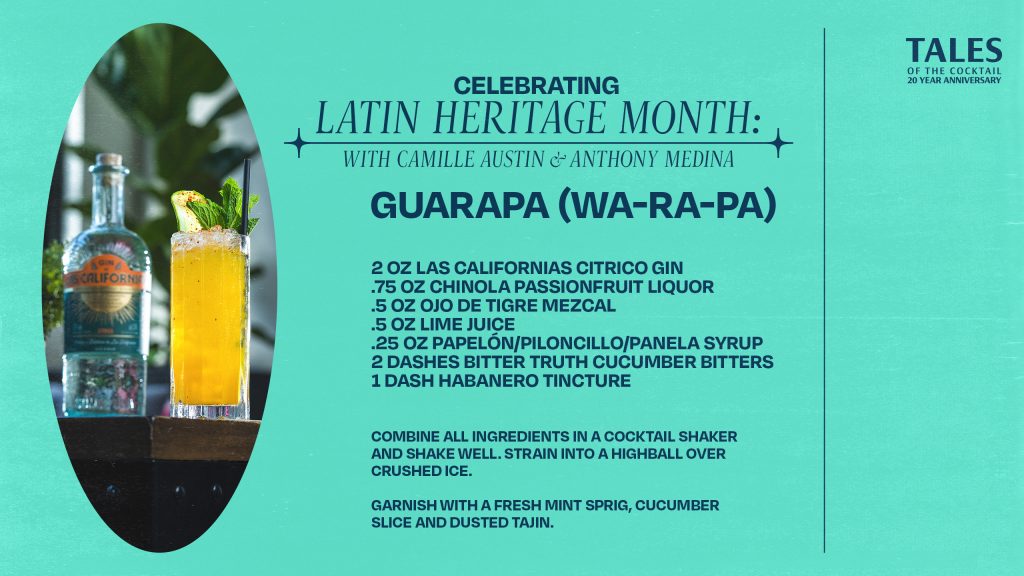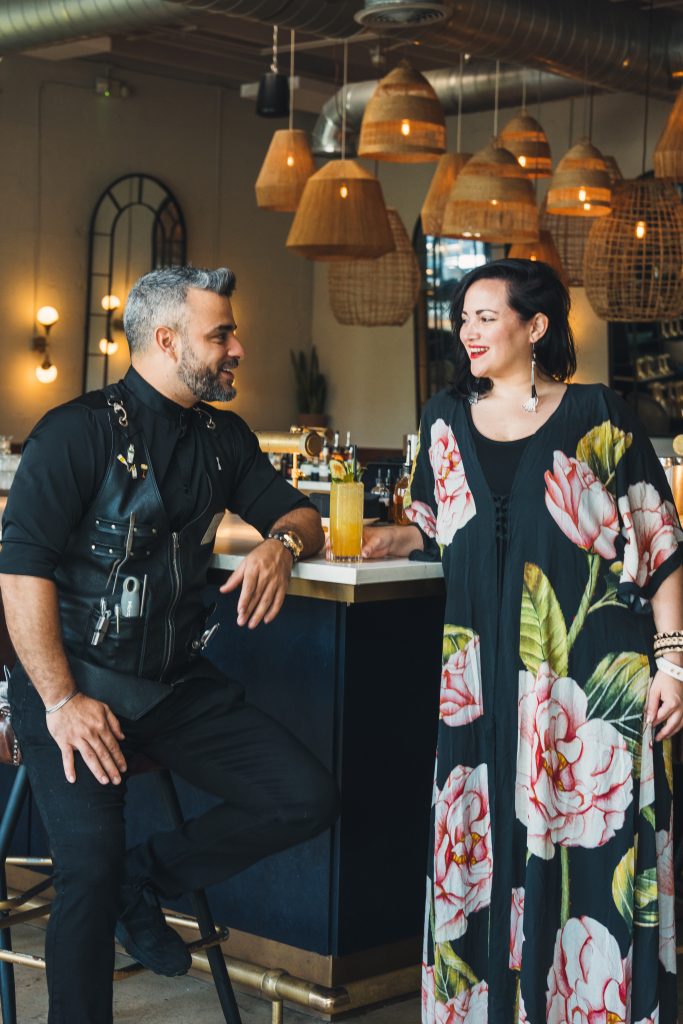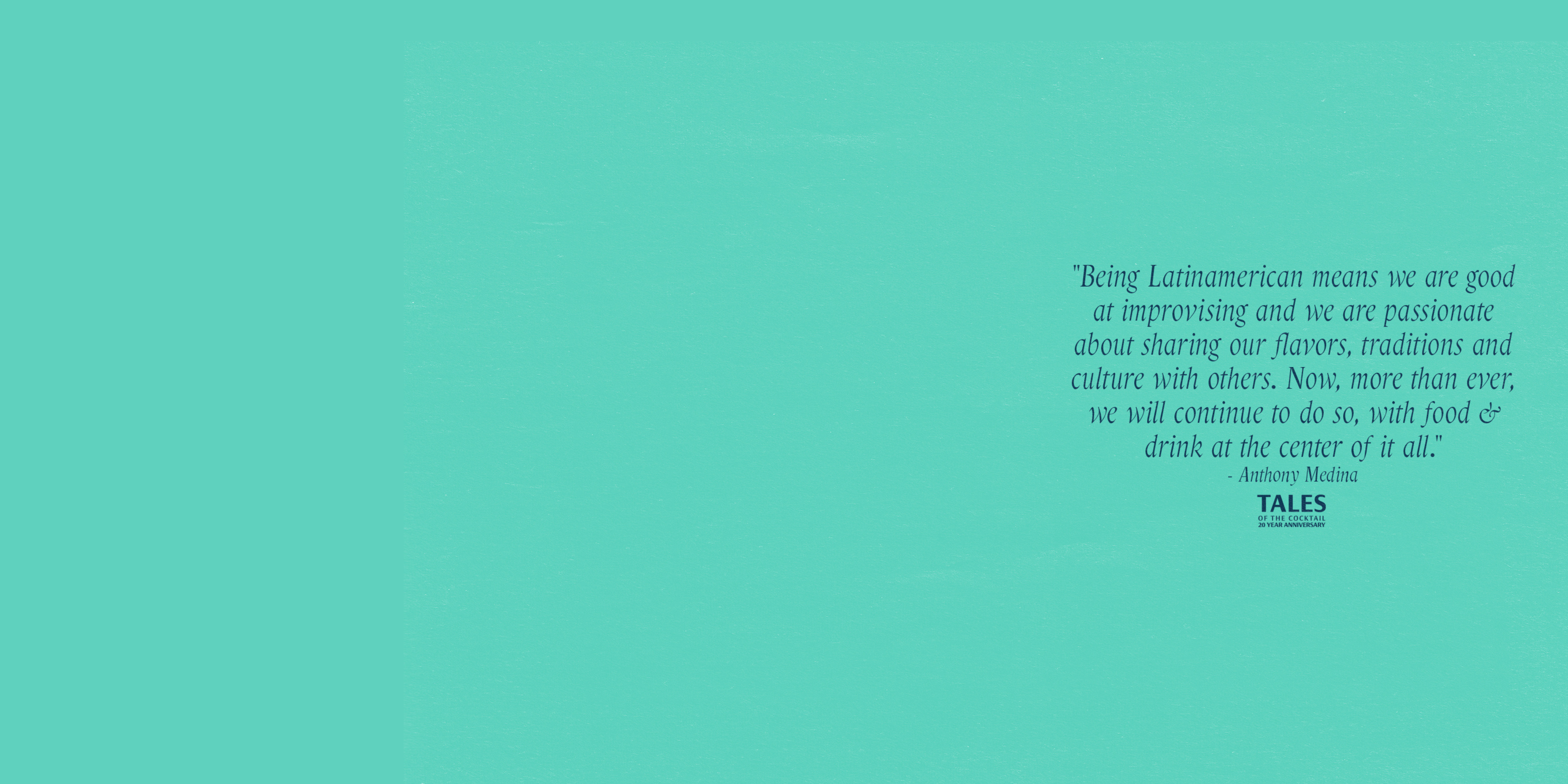(Come, Let Me Make You a Drink)
There’s something about that bar that always makes you feel welcome, and the bartender that, through their hospitality, makes you feel like you’re not alone.
In mid-pandemic, I moved back to Miami. The Magic City had changed so much since I left over a decade ago, but one thing has remained the same: its vibrant and unmatched latinidad. Through an exploration of my new drinking haunts, and meeting bartenders and chefs doing some really interesting things, I met Anthony Medina, a talented Venezuelan bartender who was also new to the city.
I popped in to Doya and Anthony could sense I had a tough week. As I sat at the bar alone, he reached to pour me a glass of sparkling water and said with a smile, “ven, te invito un trago” (come, let me make you a drink).
I watched with curiosity as Anthony walked back over to his well to prepare my drink.
He reached for a gin and a mezcal (two of his favorite spirits) and passionfruit liquor, which I later learned always reminded him of his roots.
Watching Anthony work was like having a front row seat at a theater. His technique was wonderfully precise and his movement behind the bar was almost like a dance.
As he began to shake my cocktail, I asked him:
Anthony, what are you making there?
He smiled, “There’s a popular drink from Venezuela that is a staple at family gatherings and beach days. It’s made of fresh fruit juice, a light spirit base such as aguardiente, and sometimes a dash of grenadine. The ingredients may change but the “Guarapita” is known to be citrusy and refreshing. Its classic version uses a passionfruit juice base, and every Venezuelan has had one at least once in their life.
What I love about this drink is that it’s such a replicable recipe that can be adapted in any part of the world.
Today I’m making you an elevated version of this drink that we’ll call “Guarapa”. A citrus-forward gin will accentuate the sour notes and a touch of mezcal will bring it all together. The amazing thing about this combination of flavors is that it doesn’t only represent Venezuela and Mexico, it’s reminiscent of the Latin American palate. Latin cultures are more connected than they may seem. In Venezuela, for instance, we also have a spirit made from agave called Cocuy.
Passionfruit, a sour fruit native to South America, is a great ingredient to brighten up a cocktail and cucumber is an iconic Latinamerican street snack, typically drenched in citrus and spices for an extra kick.
We like our flavors like we live our lives: vivos y llenos de color (vibrant and colorful)!”

You say Latin cultures are interconnected. What do you mean by that?
AM: “Although we each have our customs and traditions, we aren’t really that different. As a Mexican, you may need chile with every meal and as a Venezuelan, my empanada isn’t complete if I don’t have a side of chile oil to dip it in. You sweeten your café with piloncillo, I sweeten mine with papelón, a Colombian will sweeten theirs with panela, and so on….but they’re all the same unrefined brown sugar. These everyday flavors are at the center of the moments that bring us together. They keep us connected to our ancestors and where we come from. In Latinamerican cultures, food and drink are at the root of everything.”
What inspired you to bring your traditions to the bar?
AM: “I fell in love with bartending in Venezuela but became enamored with cocktails while working in New York City. As an immigrant, adapting to the Big Apple at the beginning was very difficult. I needed to learn English, a new culture, service standards and cocktail techniques all at once, and although I had quite a bit of experience working as a bartender already, I was starting from the bottom. I spent 6 years learning and adapting, discovering new spirits, flavors, cocktail styles, and in addition to the spirits I knew well like cane, I quickly fell in love with gin while working at a gin-centric bar in the West Village. What stood out to me the most was the seasonality of drinking trends. As time went on, I began to research ways I could incorporate those nostalgic flavors from my culture year-round on my menu, experimenting with different fruit liqueurs and bitters.
Latin(o)/(a)/(e)s call it adding “sazón” (flava)!”
How is your latinidad reflected now in your bar program?
AM: “After the pandemic, I moved down to South Florida and was recruited to open a restaurant bar in Wynwood that would focus primarily on gin, the spirit that I fell in love with. As a melting pot of Latinamerican cultures, I knew I had an opportunity in Miami to bring gin to more palates in my own way by incorporating the flavors of my heritage along with the sophisticated cocktail styles I learned in NYC.
But it’s not just what we do, it’s about how we do it, how we make people feel. When a guest walks into my bar, I want them to feel as comfortable as possible to enjoy a bit of escapism from their daily routine. For those next few hours, I want them to forget their problems and believe that anything is possible.”
When I sit at your bar, it almost seems like you are dancing to your shaker.
AM “My shaker is like a maraca! A good maraca is always memorable. La maraca is a small Latinamerican instrument of indigenous origin that requires a certain movement technique to play successfully. I adopted some of that rhythm in my shaking so that bar guests will notice and feel excited to experience a cocktail. When I shake, as when I play la maraca, this familiar sound generates an emotion in others, erases the borders of our origins, and creates a link between the flavors and the moment.
They ask themselves, “What is he making? I want to try that, I want to try that maraca.”
What do you believe the future of Latin culture holds?
AM: “The pandemic enhanced our global connectivity and encouraged us to revisit and recreate using the flavors and traditions local to us. As a consequence of a challenging time, we regained this pride in focusing on our flavors, colors, aromas, traditions and music. People from all walks of life are appreciating this.
Being Latinamerican means we are good at improvising and we are passionate about sharing our flavors, traditions and culture with others. Now, more than ever, we will continue to do so, with food & drink at the center of it all.”

ABOUT ANTHONY MEDINA
Anthony Medina is an acclaimed bartender and operator from Caracas, Venezuela.
For over 20 years, he has honed his passion for flavors and hospitality from behind and across the bar throughout Latin America, New York and now, Miami.
In 2021, Anthony created the bar program at DOYA Wynwood, where he aims to position the gin-specialized restaurant bar as an exciting space where all are welcome to ‘come have a drink with him’.
Instagram: @anthonymixology
ABOUT CAMILLE AUSTIN
Camille Austin is the Senior Director of Advocacy for Mexican-born global spirits innovator Casa Lumbre, originally known for Mezcals, Liqueurs and Tequilas. Among their most recent portfolio additions is Las Californias Gin, a unique range of dual origin gins distilled without borders, using botanicals from both California Alta and Baja.
Camille’s passion for her Mexican culture and creative storytelling has inspired her to build a team of advocates who share her dedication to celebrating old and new traditions through memorable experiences and great drinks.
In 2020, she was named Best International Brand Ambassador at the Tales of the Cocktail Spirited Awards.
In celebration of Latin Heritage Month, Camille is supporting United We Dream.
Instagram: @lalobalpha
———————
PHOTOGRAPHY BY: RC Visuals





